How to Keep Your Hens Happy, Healthy, and Laying Eggs.
When you first get backyard chickens, figuring out how to take care of them is usually not a big deal. Almost everyone seems to know someone who has previously raised chickens, and who’ll give you some tips.
To be honest, chickens are not that difficult to care for, but to keep them safe, healthy and productive, you really need to understand their basic needs and what to look out for. Read on to find out more…
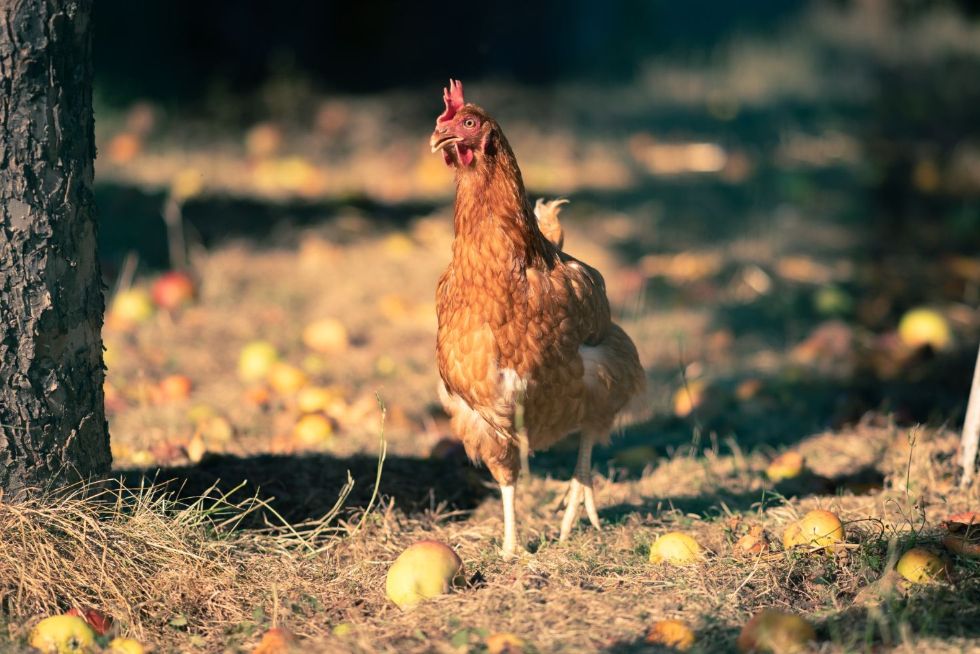
Chickens Need Shelter from Sun, Rain, Heat and Cold → The Chicken Coop
So you want to raise chickens. Luckily, most chickens are pretty hardy animals — robust birds that, all the same, need protection from the forces of nature.
Although most of the year, chickens might seem content sleeping under the stars, they’re actually much safer sleeping inside a coop. The chickens will see the coop as a safe place — the place they’ll go to shelter from the rain, huddle together from the cold, or shade themselves from the sun.
Technically, almost anything can serve as a chicken coop: a wooden box, an old barn, or a brand-new barn for that matter. Chickens really aren’t picky — as long as they feel safe, it’ll do. If your coop is big enough, the chickens can even stay inside all day during storms or heat waves.
Getting your hens accustomed to sleeping in a chicken coop will usually increase the chances of them laying eggs in that coop… although free-ranging chickens are often annoyingly very good at finding alternative nesting locations.
Read more about your options for chicken run & coop on this page!
Chickens Need Protection from Predators
How high can a chicken fly?
Most chicken breeds have lost the ability to easily fly into a tree to find protection from predators — that means it’s up to you to guarantee their safety. Be warned, however, that chickens can fly up to a height of about 10 feet (3 meters), but a 6-foot (about a 2-meter) high fence usually does the trick.
Chickens Predators…
Chickens have so many different predators, that it’s a challenge to list them all. Chickens and their eggs are a scrumptious snack for many four-legged and two-legged creatures, as well as the slithering no-legged ones.
Depending on where you live, you might have to protect your chickens from snakes, rats, small critters (who will usually steal eggs or attack the weaker members of the flock), foxes, wandering hunting dogs, and even neighborhood pets.
Then there are the coyotes and big birds like eagles and hawks who might swoop down and carry away your hen for a snack. Let’s look at the different ways to keep your flock safe.
A chicken run to protect your chickens
In most cases, a chicken run will go a long way in protecting your flock from any pesky predator. Depending on which particular predators you have in your area, your run will require different specifications.
In certain parts of Spain, for instance, a night predator called a common genet is rather catlike in that it can scale a short fence, I’ve had to either increase the fence height or enclose the roof of my coop.
The idea of free-ranging chickens is lovely, and it is indeed possible to offer your chickens both some unimpeded daytime wandering as well as enclosed nighttime protection.
Although keep in mind, if you’re planning a veggie garden, make sure to house the chickens far enough away so that they don’t discover your lettuce and kale. A little nibbling is one thing, but a desiccated garden is another. You could also fence off your garden (and maybe install a screen door for your house, or you might have some two-legged guests).
A rooster who protects his flock
Several factors make up a “good rooster” — one who watches over his flock and doesn’t attack humans.
An up-to-scratch rooster will courageously safeguard his flock (especially against the smaller critters). This isn’t, nevertheless, a quality with which each and every “roo” out there is automatically gifted. In my experience, the rooster’s protective instinct appears to be hereditary: Once you’ve got a line of good protective roosters, you’ll want to hang on to it.
A rooster’s personality can be rather inconsistent and unpredictable: their behavior often changes when they reach adulthood (around 6-7 months old). Many people report cuddly cute young cockerels who grow up to be nasty adult roos.
What to do if your rooster becomes aggressive toward humans
If your rooster suddenly or unexpectedly becomes aggressive toward you or others, in most cases you can easily turn this around.
Under no circumstances should you fight back, as you’ll see this only makes it worse: you’re signaling to your rooster that you are, indeed, someone to get into a fight with. And once you start confronting him, he’ll only learn to attack you at every occasion – even if he loses every time.
Running away doesn’t help either: it only gives him a victory – so he can do the same thing again next time.
The method described on this page, where you act like the rooster’s boss, is the most common one but hasn’t really worked for me. Instead, I recommend picking him up – like described here. I learned this from someone who said I should parade him around the run, so the whole flock could see I was the boss of him. It’s worked for me every time.
Whatever you do, keep your movements slow and deliberate. Chickens (and roosters even more) get ticked off by fast movements.
For these reasons, you don’t want to allow young children to spend time alone with a roo.
I’ve seen many turn and suddenly start attacking children. An older child, or an adult for that matter, can often fix and resolve an aggressive rooster by using the appropriate techniques, but it’s obviously challenging for a toddler to ascertain his/her dominance over a great big boy chicken!
Using dogs to protect your hens
Another option for safeguarding your flock is to acquire a quality farm dog that can fend off animals like stray canines and foxes.
A Livestock Guardian Dog (LGD) can even ward off larger animals, such as bears or coyotes. Keep in mind, however, that livestock guardian dogs are very specific breeds and need to be raised and trained just right in order to take on this task.
Although you could train other similar breeds to guard your animals, they will likely lack the instinct of a “full” LGD breed.
Also, a so-called LGD breed that has been raised as a cuddly family dog will not be as effective against predators as one who’s been raised with his charges. Read more about Livestock Guardian Dogs in this article.
Other animals that can protect your chickens
You have a few options for chicken-protecting guard animals:
A donkey will do its best to protect itself, and thus the nearby chickens, against medium-sized animals, such as foxes and coyotes. Smaller non-threatening predators to the donkey, such as rats and eagles, unfortunately, can easily slip past a jack or a jenny and attack the flock
Like donkeys, llamas and alpacas are also prey animals (so don’t expect much against larger-sized predators such as wolves and bears) — but they’re often pretty effective as protection from foxes
Geese, territorial and larger than chickens, will deter smaller predators, like weasels, skunks and rats, however, one goose will serve as more protection than multiple geese, who might hover away as a group and leave your chickens to fend for themselves.
What Do Chickens Eat? How Much Food Do Your Hens Need?
What do chickens eat? Are the eggs affected?
Chickens are omnivores — they will basically eat anything. Many larger chicken operations choose to keep chickens on specific foods like grains or corn; this is cheap and effective in the short run.
Chickens who have been fed a very limited grain-based diet lay eggs with noticeably pale yolks, signifying a lack of protein. Free-range grazing chickens, on the other hand, will lay eggs with yolks that are variations of a bright pumpkin orange hue.
Free-ranging chickens will eat almost anything: grass, various plants, berries, stale bread (that’s best soaked in water to soften it), meat scraps, worms and insects. There’s very little that your chickens won’t eat — foodstuffs like avocado and banana peels, coffee grinds and olive pits.
Free-ranging your flock not only lowers your chicken feed bill but also is very healthy for your chickens. Crack your egg into the frying pan and see those bright orange yolks for yourself!
If, however, you don’t have the option to let your flock graze freely, you can always supplement their chicken feed with kitchen and garden scraps, leftovers from your family dinner, or let them scratch around in the compost pile.
To keep your flock safe, let’s take a look at some potential dangers to your feathered friends.
What shouldn’t you feed your hens?
To be honest, chickens are pretty hardy animals and they mostly stay away from foods that they don’t like or that could be harmful to them. For instance, most chickens wouldn’t touch citrus fruit with a ten-foot pole. That being said, perhaps they’re simply listening to their instinct — citrus might not be good for them anyway.
Similarly, chickens steer clear of avocado pits and peels — although I continue to throw my avocado peels in the chicken coop (not the pits, however, I like planting the pits!). Those clever chickens will peck the avocado peels clean.
As far as potentially dangerous foods: you might avoid giving your flock chocolate and unripe tomatoes and potatoes, which are said to be toxic to chickens. The jury’s still out on ripe potatoes (I’ve been feeding mine tomatoes for years, they love them), but some folks boil the discarded potato peels for a couple of minutes and then toss them into the chicken coop.
Onions and garlic are oftentimes not given to chickens, but simply because their eggs will take on the potent taste. I thought I might like to try some garlicky, oniony eggs, so I threw some in for my chickens, but they, unfortunately, wouldn’t touch either of the kitchen-staple alliums.
Since then, I’ve been adding onion and garlic scraps to the chicken coop regularly – as a part of the “deep litter” method (where my flock doubles as a compost-creating crew).
How long can chickens go without food?
A question we often receive from people preparing for their holidays is: how often should the chickens get fed, and how long can they go without food (just in case)?
Because of their relatively high metabolism, chickens will typically peck away throughout the day. When they receive a large bowl of chicken feed, they’ll usually fill up at night and go to roost with a crop and stomach full of food to digest.
That being said, chickens are pretty hardy animals and one day without food won’t kill them. Chickens are cannibals, though, so if and when their hunger becomes unbearable, they will resort to killing and eating the weakest in the flock.
If you’d like low-maintenance chickens or you’re looking to be away for one week, giving them one big bowl of food, for instance, could attract other feeders, such as birds, or even other rodents or animals.
Another problem with leaving out a bowl of food is that your chickens might devour all the food within the first two days, and then have nothing left for the other five.
To be honest, I really would not recommend leaving your chickens alone for more than a couple of days.
Important: Chickens Need Drinking Water
Your hens need fresh water more than they need food. When they’re out of water, most hens will stop laying right away — some will instead start eating their own eggs. Chickens simply can’t lay eggs if they don’t have access to fresh drinking water.
How Long Can Chickens Go Without Water?
When left without water for a period of 24 hours or so, most hens will stop laying for several weeks. Be careful, though, you don’t want to put this to the test during a hot and dry summer — chickens might not survive more than 48 hours without access to drinking water.
Last But Not Least: A Bath for your Chickens
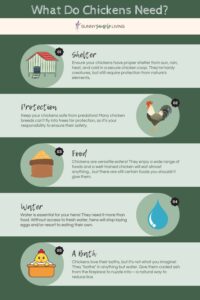
When I say bath, I don’t mean a porcelain tub with candles and a pillow for the head. Chickens enjoy a bath, but they “bathe” in anything but water.
If you have cooled ash from the fireplace, the chickens will enjoy nuzzling down into a pile. This also serves to eliminate or greatly reduce the population of lice.
When given the chance (and if the soil is suitable for it), chickens will dig a shallow bowl directly into the ground, and then fluff up their feathers and “bathe” in the dust. Obviously, this is doable if your chickens have access to the outdoors and aren’t cooped up in a cement-floored henhouse.
Recap: Chickens Need Shelter, Protection, Food and Water
Chickens are pretty robust, simple, easy-going creatures. Taking into account the above basics will more than likely keep your flock happy, healthy and laying fresh eggs daily.

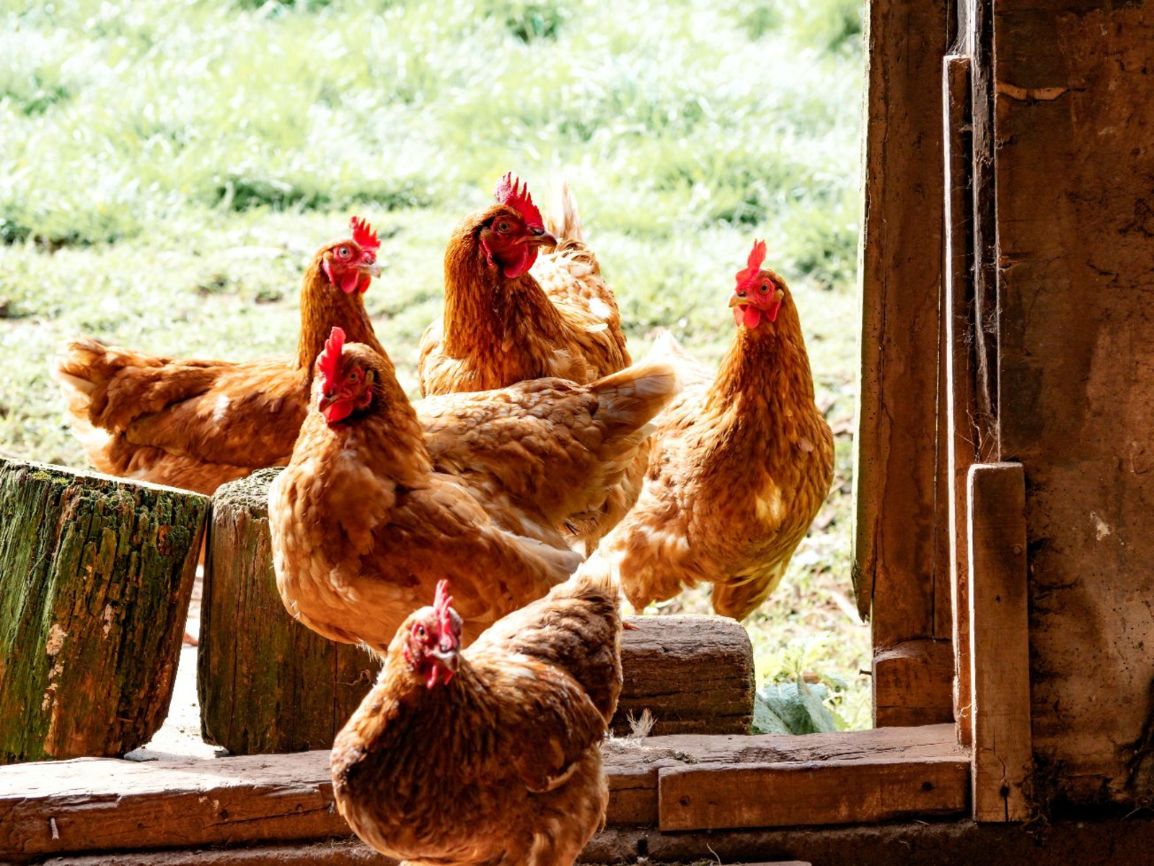
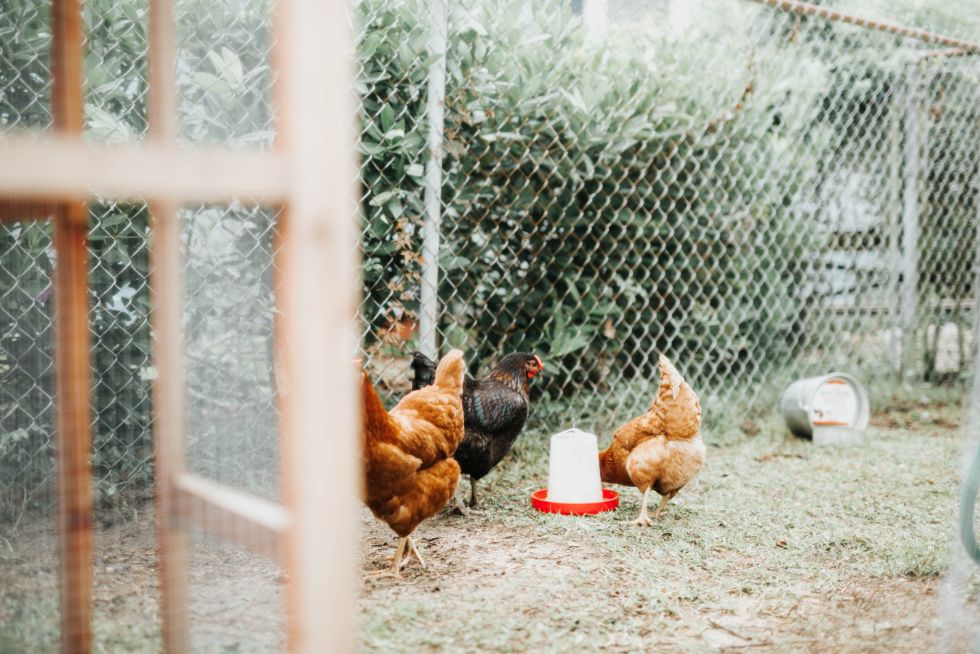
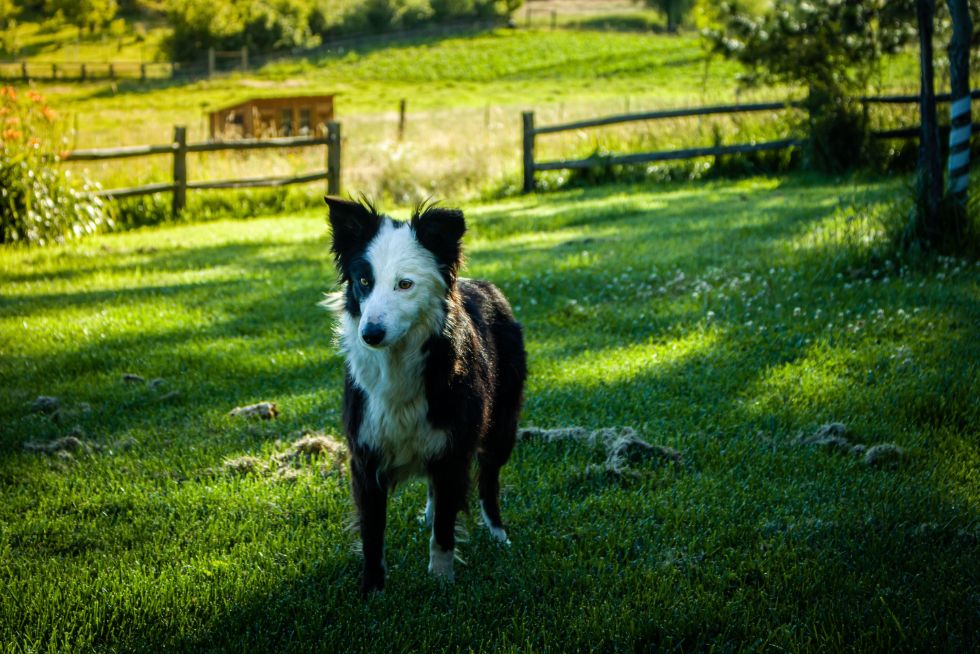

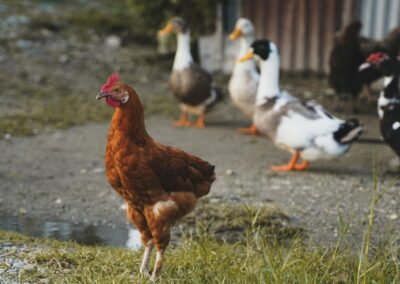
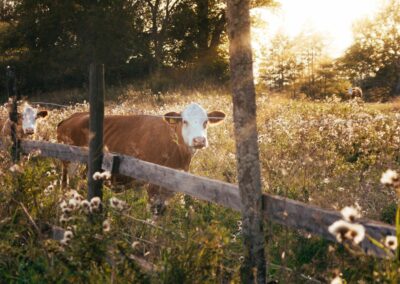
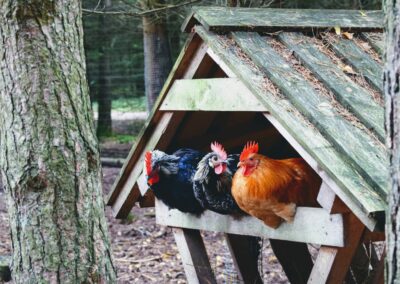
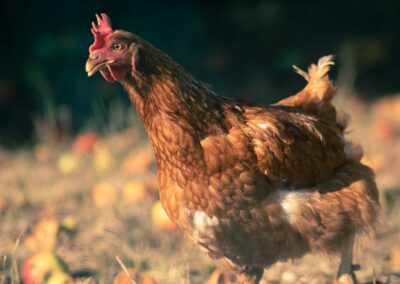
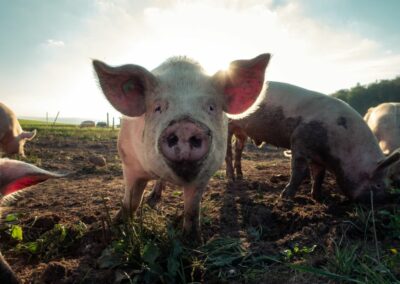
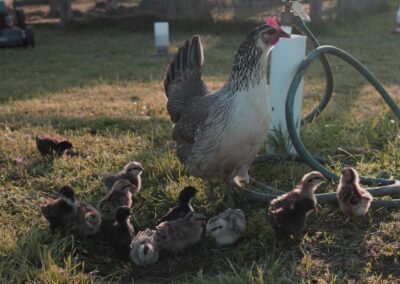
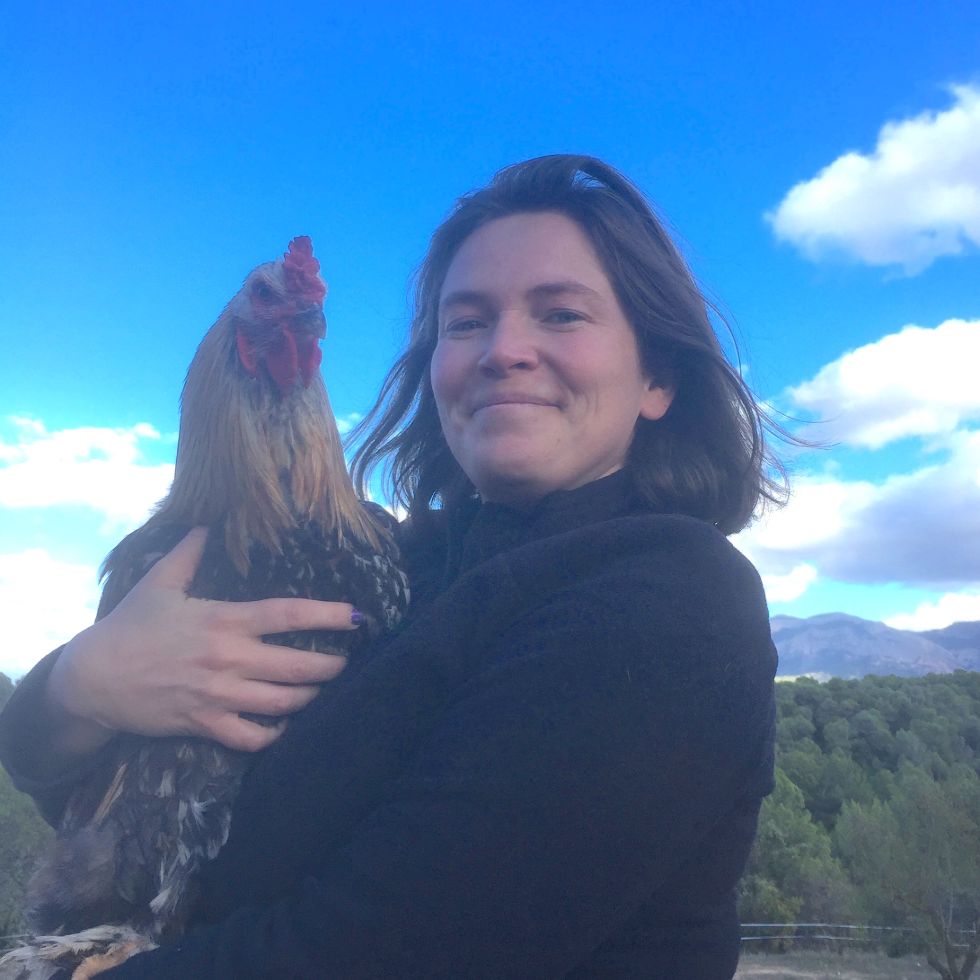
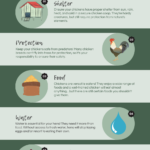
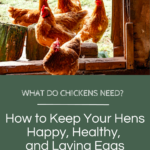

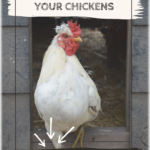
0 Comments